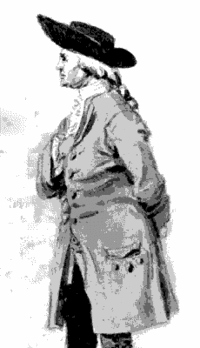Henry Cavendish: Difference between revisions
No edit summary |
No edit summary |
||
| Line 13: | Line 13: | ||
Henry Cavendish died in London, England on February 24, 1810. He was known to be one of the wealthiest men in Britain, and he was buried in Derby Cathedral among many of his ancestors. | Henry Cavendish died in London, England on February 24, 1810. He was known to be one of the wealthiest men in Britain, and he was buried in Derby Cathedral among many of his ancestors. | ||
[[File:hcav.gif]] | [[File:hcav.gif|200px|thumb|This is one of Henry Cavendish's only portraits which was only estimated when drawn]] | ||
==Scientific Work== | ==Scientific Work== | ||
Cavendish was a physicist and a chemist who determined the value of the universal constant of gravitation, created great impact on electrical studies, and discovered hydrogen and the composition of water. | Cavendish was a physicist and a chemist who determined the value of the universal constant of gravitation, created great impact on electrical studies, and discovered hydrogen and the composition of water. | ||
Revision as of 17:50, 2 December 2015
By yan49

Personal Life
Early Life
Henry Cavendish was born in Nice, France on October 10 ,1731. His father was Lord Charles Cavendish and his mother was Lady Anne Grey who died soon after Henry Cavendish was born. His family lineage traces across eight centuries and is closely connected to many wealthy families of Great Britain. He attended Dr. Newcomb's Hackney Academy in Hackney, England as a child. In 1749, he attended Peterhouse, Cambridge, but he left without a degree after three years. Because he was so shy, there are rumors that he was autistic. He did not socialize with anyone other than his close scientific colleagues.
Adulthood
After he left Cambridge, Henry Cavendish moved back to London to live with his father. He built a laboratory and a workshop there. He moved the laboratory to Clapham Common when his father died in 1783. Henry Cavendish never married and was very reserved, so there are not many records of his social life.
Death
Henry Cavendish died in London, England on February 24, 1810. He was known to be one of the wealthiest men in Britain, and he was buried in Derby Cathedral among many of his ancestors.

Scientific Work
Cavendish was a physicist and a chemist who determined the value of the universal constant of gravitation, created great impact on electrical studies, and discovered hydrogen and the composition of water.
"Inflammable Air"
Awards
See Also
Further Reading
Cavendish, Christa Jungnickel and Russell McCormmach, American Philosophical Society, 1996, 414 pp.
Cavendish: The Experimental Life, Christa Jungnickel and Russell McCormmach, Bucknell University Press, 1999, 814 pp.
External Links
References
http://www.chemistry.mtu.edu/~pcharles/SCIHISTORY/HenryCavendish.html
http://www.notablebiographies.com/Ca-Ch/Cavendish-Henry.html